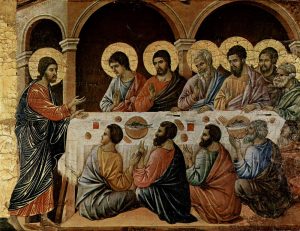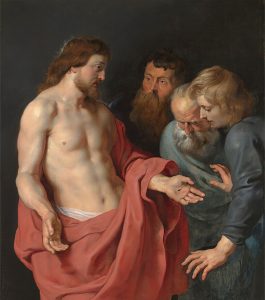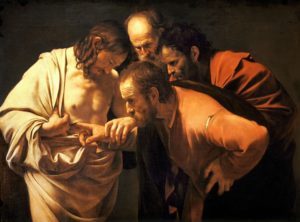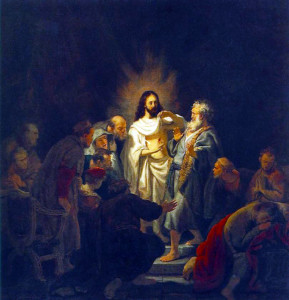Thoughts on Sunday’s Lessons for April 7, 2024 (Easter 2B)

Christ Appears to the Disciples at the Table after the Resurrection (1308-1311). Tempera on wood panel from the Maesta Altarpiece of Siena by Duccio di Buoninsegna (1255-1319). Museo dell’Opera del Duomo, Siena, Italy. (Click image to enlarge.)
First Reading: Acts 4:32-35
Christ is risen, and we move forward with joy into the 50 days of Eastertide. Throughout this fifty-day period, our Sunday first readings will be selections from the Acts of the Apostles, the evangelist Luke’s story of the life of the early church. In his Gospel, Luke consistently emphasizes Jesus’s command to shun riches and to serve the poor, the weak and the oppressed. It should be no surprise, then, that in Acts Luke presents the practice of sharing all possessions and caring for the poor as the customary lifestyle of the apostles. This practice would be a hard sell in 21st century politics, which might give us food for thought as we ponder Jesus’s promise of good news to the poor.
Psalm: Psalm 133
Sounding a theme that resonates with the sharing lifestyle that Luke presents in the early church in Acts, the Psalmist celebrates the joy of a community that lives in unity like brothers and sisters. The earthy image of anointing oil running down Aaron’s head, beard and robe may sound odd to our modern ears. But, like the familiar Gospel story of the woman who anointed Jesus with expensive ointment, this reminds us that the most desirable luxuries are not to be hoarded but abundantly shared.
Second Reading: 1 John 1:1-2:2
Our second readings during Eastertide will take us through the First Letter of John. Although this letter was almost certainly not written by the evangelist we know as John, its emphasis on love and on Jesus as the Word and the Light is consistent with the style of John’s Gospel. This document may well have originated later in the same early Christian community that gave us John’s Gospel. “If we say we have no sin, we deceive ourselves,” Sunday’s verses tell us, adding the assurance that, when we confess our sins, God will forgive us and restore our righteousness through Christ.
Gospel: John 20:19-31
Jesus has died. Christ has risen! And now Jesus begins appearing to the disciples, often in mysterious ways that defy imagining. The doors are locked. The apostles are terrified. Then Jesus suddenly appears in the locked room, and their fear is transformed to joy. Thomas, who had missed Jesus’s first appearance to the others, remains doubtful. For this he is remembered forever as “Doubting Thomas.” But Jesus understands. And Thomas, too, like all the others, goes on to testify that Jesus is the Messiah, the Son of God, and that we all have life in his name.



